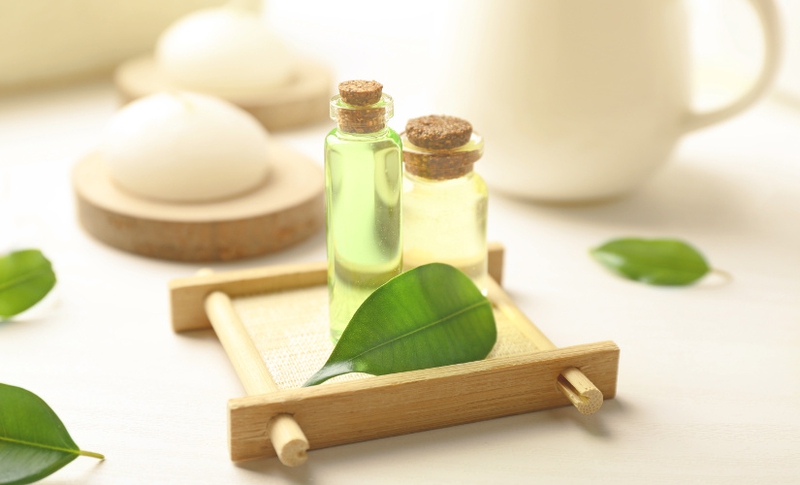In general, women are asked not to take medication when they are pregnant. It is popular to turn to alternative remedies like tea tree oil because they are considered "natural" and therefore harmless. However, this is far from the truth. In this article we will explain questions like "Is it safe to use tea oil while pregnancy", "How you can use them", "Which plant-based remedies are safe", etc.

Is It Safe to Use Tea Tree Oil During Pregnancy?
When talking about using tea tree oil, pregnancy is often one period that needs special attention. First, let's know something about this kind of oil. Most essential oils are made by extracting oil from some part of the plant. So is tea tree oil. Tea trees grow mainly in Australia and the oil is extracted from the leaves. However, you should know any original oil is concentrated, very powerful and should never be used in this pure form since this could result in poisoning and other serious side effects. It must be diluted in a liquid or barrier cream. What's more, it must never be swallowed. Since that will cause adverse side effects which can include:
Poisoning leading to confusion and disorientation
Inability to walk properly
Rashes and inflammation on the body
Going into a coma if more than 120 ml is swallowed – about 8 tablespoons or half a cup
So, according to The Mayo Clinic, it is safe to use tea tree oil during pregnancy and breastfeeding as long as it is suitable diluted and applied externally to the skin. However, it should be avoided during labour since laboratory tests have shown that it may decrease the strength of contractions during delivery. This could put the mother and her infant’s life in danger.
How to Use Tea Tree Oil During Pregnancy Properly
You have known for using tea tree oil, pregnancy is one period with special note. So do you know detailed ways to use it? Keep reading on to learn it.
Foot baths. 3 to 5 drops of oil in hot water will relieve swelling, tone up muscles and combat germs. It nourishes the skin and can improve varicose veins.
A long bath will help you feel relaxed; it will clear your mind and leave you energised and uplifted. The vapour also relieves symptoms of cough and colds. Some women find it also helps reduce nausea. Like footbath, just add 3-5 drops to the water.
It is excellent for any fungal infection. Apply a compress of diluted oil directly to a nail for the positive result.
Tea tree oil also encourages the repair of skin cells and has a cosmetic use for people with various skin problems. It can really improve flaky skin and is especially useful in controlling the tiny mites that exist in oily skin conditions.
Use 2 drops of oil in a glass of water as a mouthwash or gargle for mouth infections. Tea tree oil has strong antiseptic action. Be careful not to swallow any of the liquid.
Things to Watch for While Using Tea Tree Oil During Pregnancy
To be absolutely safe, when considering trying tea tree oil, pregnancy tips should be consulted by talking to a healthcare professional. Below are some you should keep in mind.
Buy your oil from a reputable source. It should be in a well sealed, dark coloured glass container which is stored in a cool, dry place. Do not buy it if there is no expiry date. If it is older than 5 years, it could cause cancer.
Watch out for any allergic reactions especially if you have been sensitive to eucalyptus, myrtle plants, Balsam of Peru or benzoin.
All essential oils are potent and have an overpowering smell. Make sure you use them in a well-ventilated area.
Tea tree oil can also cause adverse drug interactions. Be especially careful if you have any chronic lung conditions like tuberculosis or asthma. Check with your doctor if you are taking antibiotics, anti-cancer or anti-inflammatory drugs. Tea tree oil can even react badly with other herbal remedies or supplementary vitamins. That's why we recommend you read the instruction carefully and ask doctor before using it.
More Pregnancy-Friendly Essential Oils
Except tea tree oil, pregnancy is one long period you should be careful with what you use. There are other essential oils that are acceptable and even beneficial to pregnant women, including:
Ylang-Ylang – A wonderful "all ronder" in relieving stress
Neroli – Also relieves stress and gives your skin a “face lift”
Sandalwood – A natural anti-depressant and is useful if you have cystitis
Patchouli – Will also help you feel more in control of your emotion during pregnancy
Orange – Helps you feel calm and at peace
Eucalyptus – If you get a minor infection and suffer from respiratory congestion.
Lavender – Use after 3 months. Will help reduce fluid retention and general aches and pains.
Geranium – Use after 3 months. Also controls aching legs and boosts energy by improving circulation.
Cypress – Use after 5 months. This really helps for swollen ankles and reduces varicose veins. If you have developed haemorrhoids, this is also an ideal natural remedy.
There are also some essential oils that you must definitely avoid. Some on this list include almond (bitter), basil, cedarwood, chamomile, cinnamon, clove, fennel, jasmine, lemon, lemongrass, mustard, myrrh, nutmeg, oregano, peppermint, pine, rose, rosemary, sage, stinging nettle and thyme
Special Note
If you have a history of miscarriage, it is better to avoid using any essential oils during your pregnancy. There are several other conditions that also put you at risk, like heart problems and blood clotting problems; epilepsy, thyroid, diabetes, liver and kidney diseases. It is better to be safe than sorry.
View All Comments /Add Comment